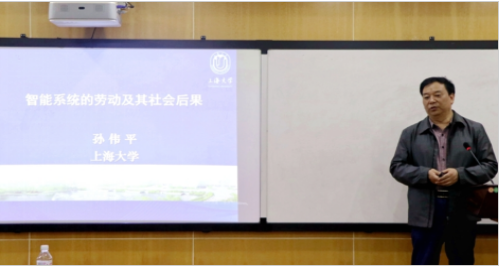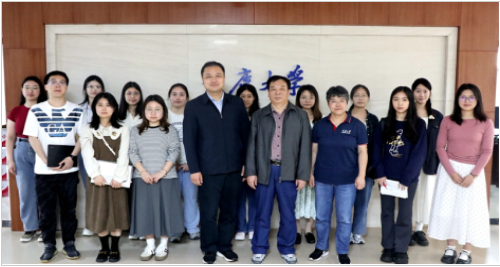On April 17, 2024, the 49th Red Rock Lecture Series was held in Room 412 of the School of Marxism at Chongqing University. Professor Sun Weiping from Shanghai University was invited to deliver a special lecture titled "Labor of Intelligent Systems and Its Social Consequences." The lecture was hosted by Professor Chen Ke, Secretary of the Party Committee of the School of Marxism, and garnered active participation from faculty and students alike.

Starting from the current development status of intelligent systems, Professor Sun proposed that compared to the development of "species evolution" and "labor capacity" in human society, the advancement of intelligent systems follows entirely different rules. He then delved into the labor of intelligent systems and their advantages, examining them from various perspectives including the domain, attitude, and status of their labor. Using intelligent cultural production as an illustration, he showcased the creativity and productivity of intelligent systems as primary agents in cultural production, particularly in fields like poetry and music.
Furthermore, Professor Sun conducted an analysis of the challenges brought about by the rapid development of intelligent manufacturing. He pointed out that automation in manufacturing, coupled with industrial transformation and upgrading, will inevitably lead to a surge in structural unemployment. In this context, "technological unemployment," a complex social issue arising from economic and social automation, will increasingly marginalize ordinary laborers, including those considered "less exploitable" and the "digitally disenfranchised," placing them in precarious positions.
Based on this analysis, Professor Sun underscored the importance of recognizing the value and rights of labor. In response to the current realities faced by laborers, he advocated for continuous advancement in the reform of education and talent cultivation models. Specifically, this entails promoting ideological shifts and cultivating "new era individuals" who are attuned to historical trends and societal changes, while also emphasizing the harmonious coexistence and collaboration between humans and machines.

In conclusion, Professor Chen Ke noted that we are currently witnessing the advent of the third paradigm revolution in the humanities. For the field of Marxism, this entails substantial and profound changes in both research methodologies and paradigms. Looking ahead, we aim to actively explore further opportunities for the deep integration of artificial intelligence with academic research, fostering the practical application of research findings.
By Liu Meirui
Photo by Liu Meirui
Copyedited by Zeng Chenxi
